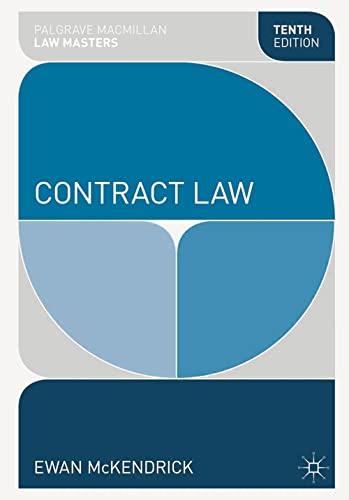Answered step by step
Verified Expert Solution
Question
1 Approved Answer
Statute of Frauds -- It is possible to have a perfectly valid oral contract. Reducing a contract to writing is not a prerequisite to its
Statute of Frauds -- It is possible to have a perfectly valid oral contract. Reducing a contract to writing is not a prerequisite to its enforceability. The exception to that general rule is found within the Statute of Frauds. The Statute of Frauds describes the statutory provisions that render unenforceable certain types of contracts unless they are evidenced in writing. The Statute of Frauds does not mean that oral agreements within the scope of the Statute cannot be made and performed or that they are illegal. It merely means that enforcement may be unavailable if one of the parties refuses to fulfill their obligations. See the 1 minute slide presentation on the Statute of Frauds https://www.youtube.com/watch?v=U7eCmKD42k4 and/or see What is the Statute of Frauds article https://www.hg.org/legal-articles/what-is-the-statute-of-frauds-31312 Why should most agreements be in writing? What are the benefits of a written contract as opposed to an oral contract? What types of "business contracts" must be in writing to be enforceable? Will a contract that is required to be in writing be void if it is not in writing? Discuss. What elements are required in a written contract for the writing to be sufficient under the Statute of Frauds? For instance, must the contract be set forth in any special form? Might handwritten notes on a party napkin constitute a sufficient writing? 2. Read the Crabtree V. Arden case summary.http://www.west.net/~smith/Crabtree_v_Arden.htm The court had to decide if there was a memorandum of its terms sufficient to satisfy the statute of frauds. Plaintiff's Argument (Crabtree): The three documents together satisfy the writing requirement under the S/F and thus a contract for employment with specific terms under which is discerned. Defendant's Argument (Arden): The documents are unsigned by the president, vague as to the length, and oral agreements are unenforceable under the statute. Explain why the court ruled as it did? What was the court's rationale? Do you agree with the court? Why
Step by Step Solution
There are 3 Steps involved in it
Step: 1

Get Instant Access to Expert-Tailored Solutions
See step-by-step solutions with expert insights and AI powered tools for academic success
Step: 2

Step: 3

Ace Your Homework with AI
Get the answers you need in no time with our AI-driven, step-by-step assistance
Get Started


